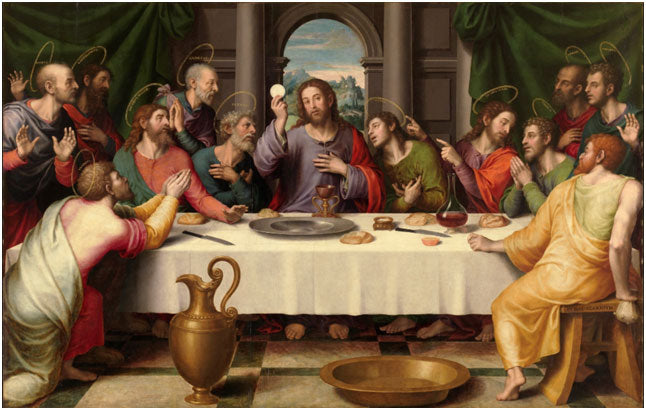The Blood of Christ - April 2019
- 27 Mar 2019
- Camilla Wood

The Conduit Magazine - April Article
by Camilla Wood, Owner/MD The Somerset Wine Company
The Blood of Christ
This month sees the marking of the religious festival of Easter, a celebration of the resurrection of Jesus Christ following his crucifixion. The histories of wine and religion are inextricably linked: the Bible is littered with references and advice for wine consumption (“Drink a little wine for thy stomach’s sake” 1 Timothy 5:23, “Wine is a mocker, strong drink a brawler, And whoever is intoxicated by it is not wise.” Proverbs 20:1)
So, whatever your individual creed, it got me thinking about the significance of wine for Christians and pondering those wines with religious connotations. Blue Nun and Dom Perignon not withstanding, the most obvious connection is the use of wine during Holy Communion as the Sacrament.
The holy wine industry is centred in California as, in some kind of masochistic fervour, early missionaries to the area chose one of the worst grape varieties they could find to make their sacramental wine. The Mission grape (so named in North America as it was brought over by Spanish missionaries in the 16th century) is also known as Criolla Chica in Argentina and Pais in Chile where it is used for making bulk wine, and is widely grown in Peru for Pisco production. It was the first vitis vinfera grape variety to be exported to the New World from the Old, where is was originally grown in Spain, known as Listan Prieto in the region of Castilla-La Mancha. Resistant to drought, it is a reasonably low-quality grape variety, with low acid, high sugar, weak colour and high yields which result in wines of little concentration and interest. However, Mission does redeem itself in a style of sweet wine fortified with brandy called Angelica, in a neat continuation of the religious theme.
How does a wine become holy you might wonder? Well, it is just a wine until it is chosen and blessed by the resident Priest of the diocese, but the Vatican gives strict instructions as to the composition of said wine. It has to be made naturally, “from the fruit of the grape, pure and incorrupt”, “not mixed with other substances,” though a “small quantity of water” is mixed in during the celebration. It’s also important the wine hasn’t turned into vinegar or soured, and “it is altogether forbidden to use wine of doubtful authenticity or provenance.”
Given that liturgical wine is used to represent the Blood of Christ one would naturally expect it to be red, but holy wine can also be white, dry or sweet, even fortified, as long as the source of fortification is also grape-derived and as long as the ABV (alcohol by volume) stays between 5 and 18%. Red wine is often used to represent the Blood of Christ, but churches started leaning towards white wine to avoid stains on the altar cloth! Sacramental rosés are also a popular selection in the USA. However, some Christian churches, such as those of Mormon faith, do not approve of the consumption of alcohol and use pasteurized grape juice or mustum instead.
So what about wines with strong religious names or connotations? Well, the wine industry has the religious communities to thank for it’s success. In the 12th century Cistercian monks developed the land around the Cote d’Or escarpment in Burgundy, planting vineyards and building stone walls around them. Clos Vougeot is one of the biggest and most highly revered Grand Crus in the region, producing some might say ethereal wines which offer religious experiences in the drinking thereof! Monasteries throughout Europe were the major producers of wine through to the 19th century - identified on many wine labels by names such as Abbaye de Fontfroide and Kloster Erberbach.
Dom Perignon, the most famous of all wine-making brothers, was a cellar master at the Benedictine abbey at Hautvillers in the mid 17th century and is largely credited with pioneering the production of méthode champenoise wines. He mastered the art of blending both black and whites grapes to produce a clear juice and successfully induced a secondary fermentation in bottle to retain the bubbles. He also introduced cork closures for the bottles and thicker glass to withstand the pressure within. A perfect embodiment of the synthesis of religion, art and science.

Wine culture and religious culture has forever been intertwined. Note the wines with religious names or connotations such as Lacryma Christi del Vesuvio, a type of red and white wine originating from the slopes of Mount Vesuvius in Campania. This was was so-named after an old myth that Christ shed tears on the land as a result of Lucifer’s fall from heaven, giving divine inspiration to the vines that grew there.
Staying in Italy, the famous sweet dessert wine made from dried grapes, Vin Santo, (“Holy wine”) is surrounded by various theories on the origins of it’s name. Mostly likely is that is was named for its use during the celebration of the Catholic Mass, where sweet wine was often favoured. However, it may also be derived from the island of Santorini (literally from labelling cases for export ‘Vin from Santo’) or from a time when the ruling Turks perfected the production of this sweet wine and exported it to Russia where it became the wine of choice for mass in the Russian Orthodox church. Another apocryphal story is that a 14th century friar from the province of Siena would used the leftover wine from the Mass to cure the sick. The healing miracles which ensued gave rise to the wine being denoted as ‘santo’ or holy.
Finally, let’s not forget the biblical connotations associated with the names of various sizes of wine bottles: from Nebuchadezzar to Balthazar to Salmanazar to Melchior - all were Biblical kings and prophets of ancient Israel, Judah, Assyria and Babylon. No one really knows why they were chosen to represent large format wine bottles, but the 17th and 18th centuries were more religious times and wine has long been a vital part of our history and daily lives. Perhaps therefore it should be no surprise that the bottle names are connected to the Bible. As Ecclesiastes (9:7) enthusiastically instructs us “Go, eat your bread with joy, drink your wine with a merry heart, for God has already approved what you do.” Happy Easter!

TEL: 01963 548228
The Deli Castle Cary
Pitchings House
Castle Cary
Mob: 07717 396635 Shop: 01963 548228
E: info@somersetwinecompany.com
Deli: charlie@thedelicastlecary.co.uk
Opening Hours: Mon - Sat 9am - 6pm
All other times by appointment
www.somersetwinecompany.com
https://www.facebook.com/SomersetWineCompany
Twitter: @somersetwineco
Instagram: somersetwineco
LUX Guide 2017 'Best West Country Wine & Spirits Purveyor'
Runner Up as 'Newcomer of The Year' in the Drinks Retailing Awards 2016
Finalist in Muddy Stilettos 'Best Somerset Wine Merchant' 2016 & 2017




